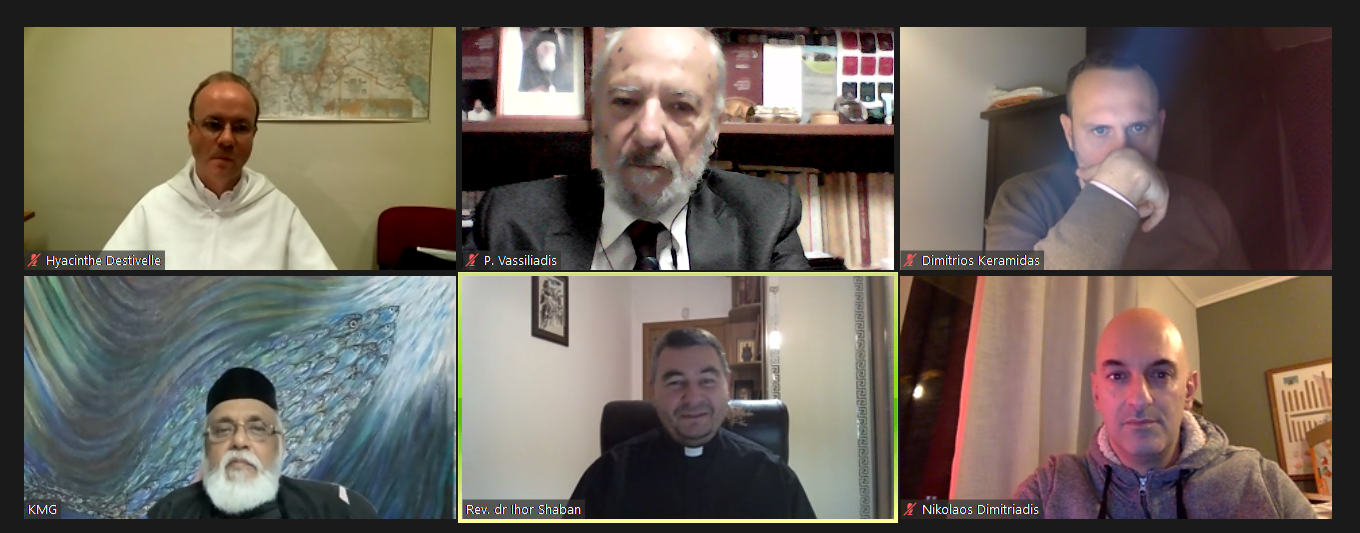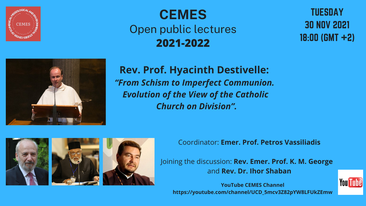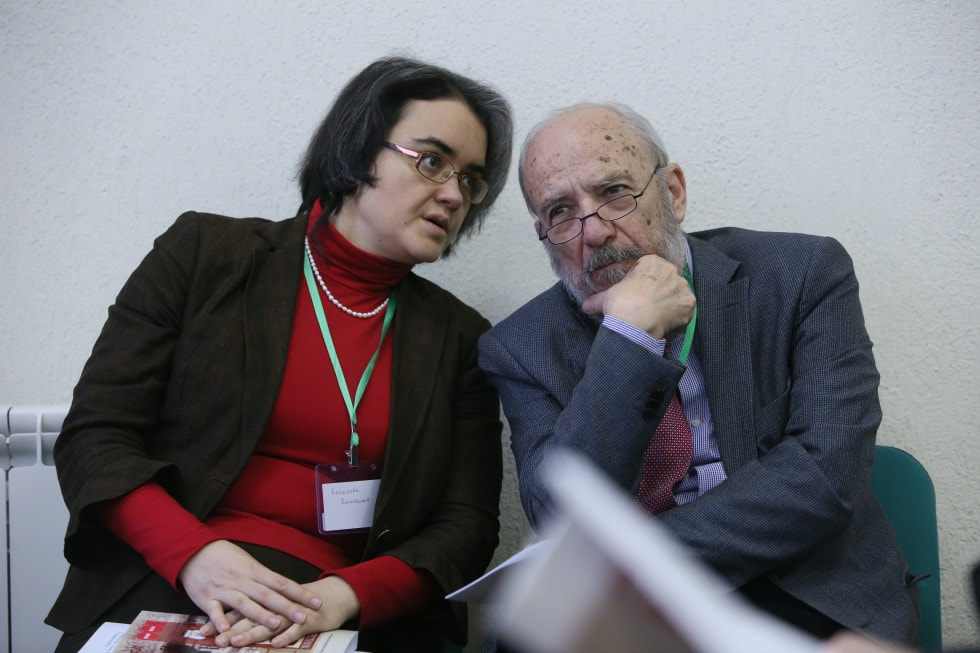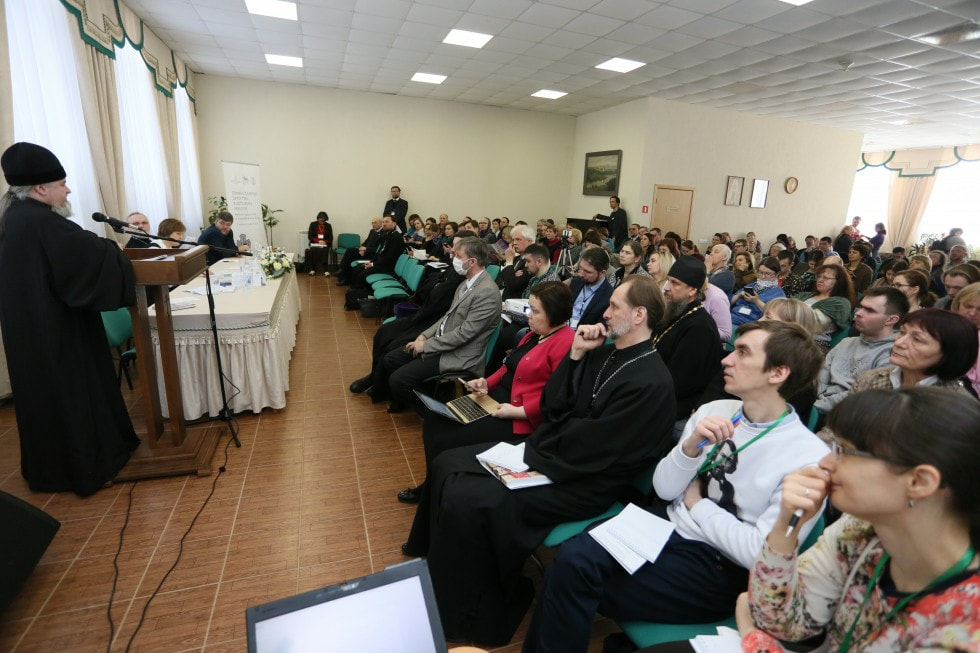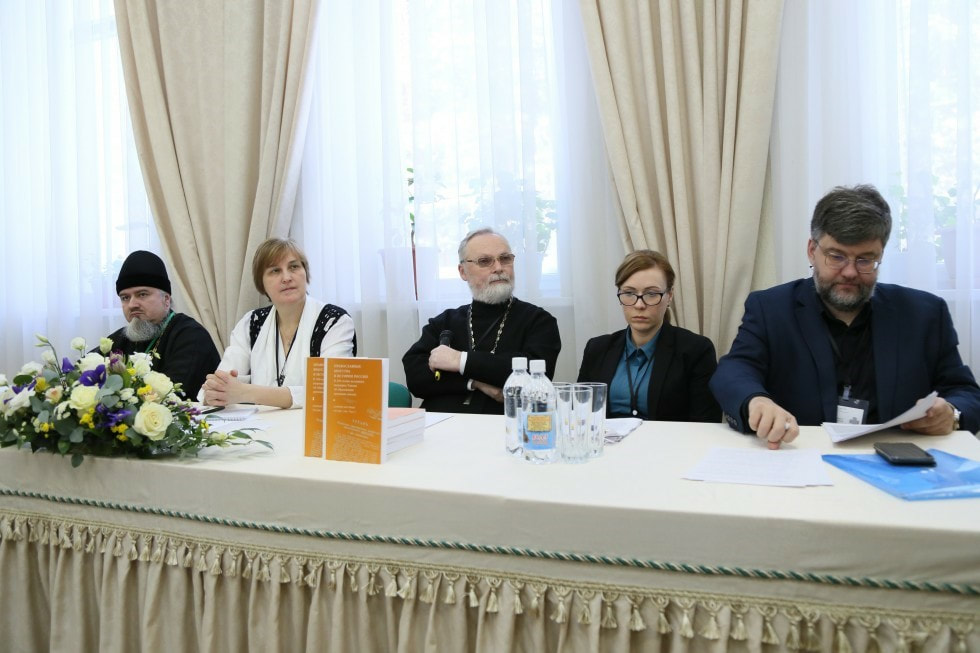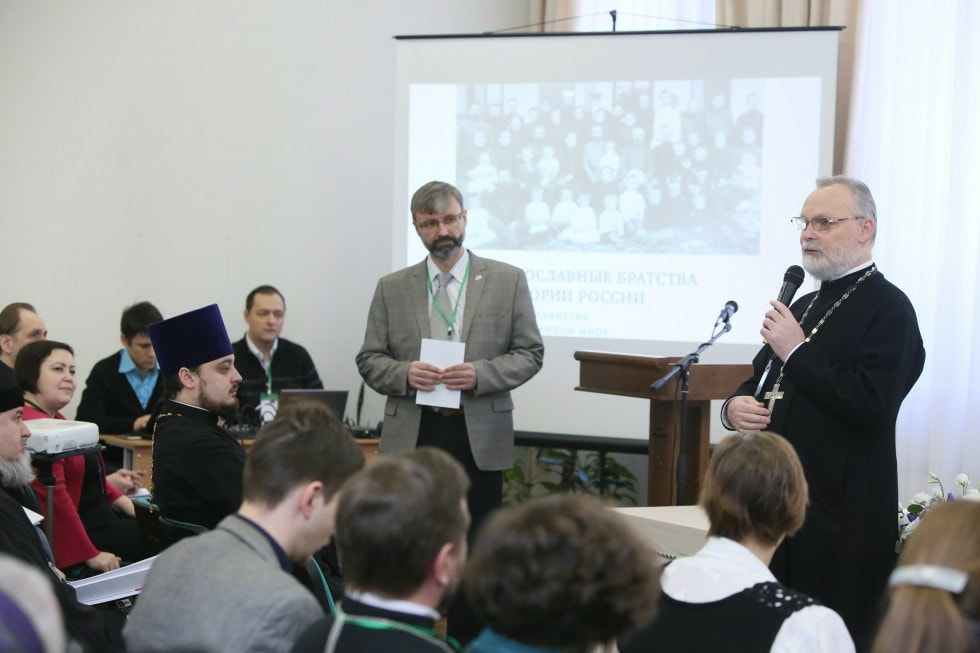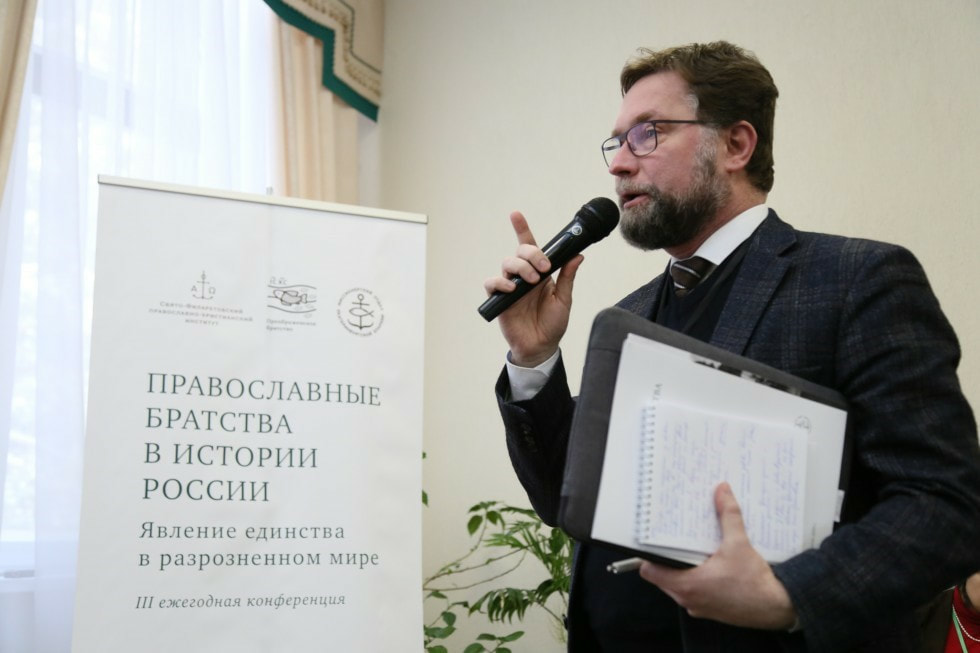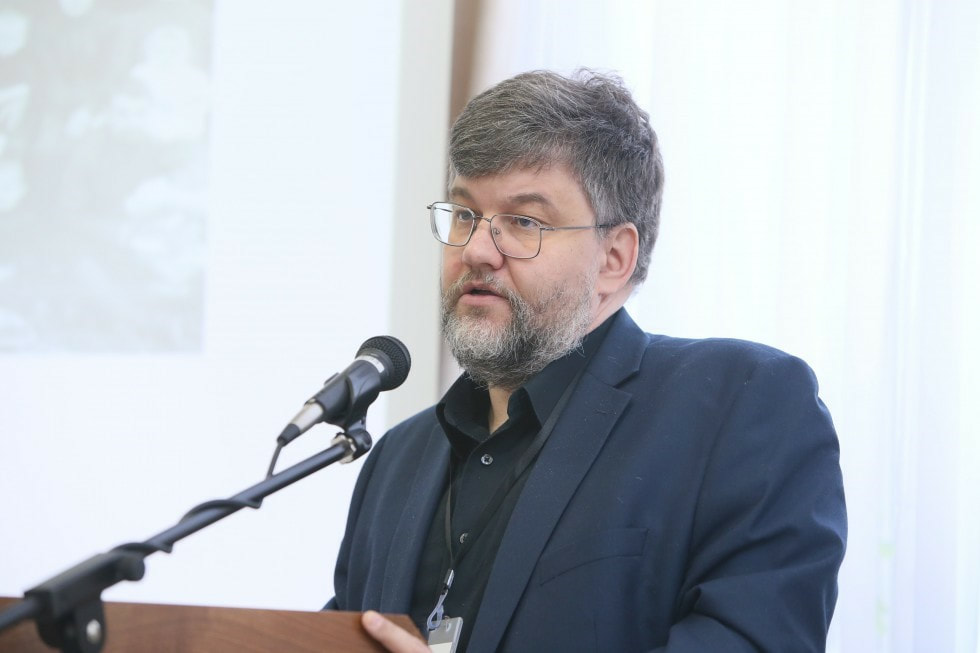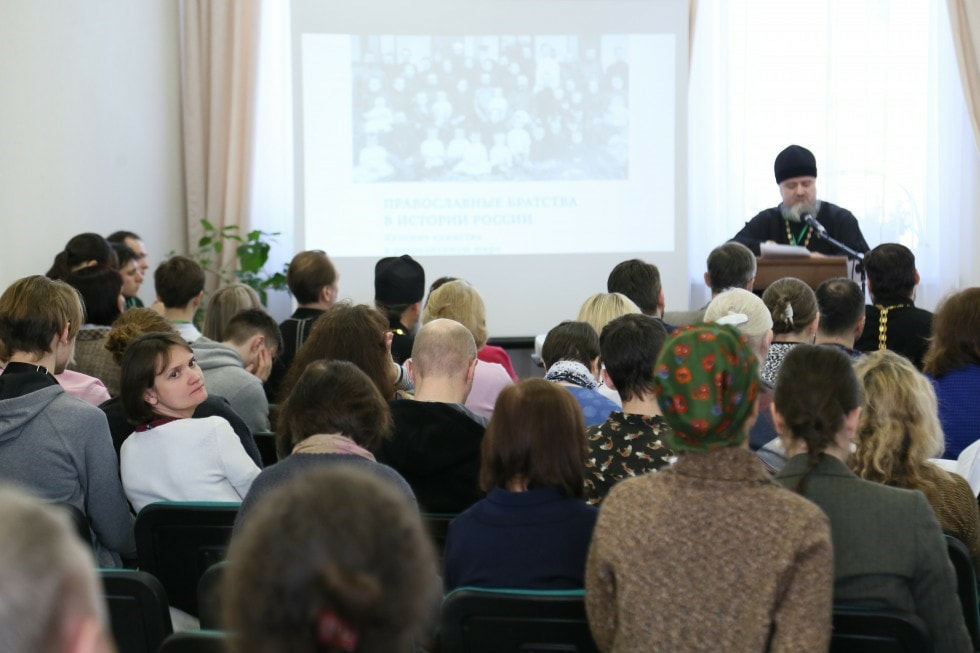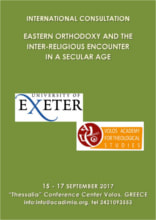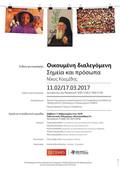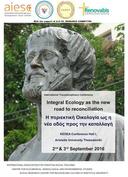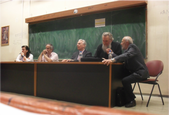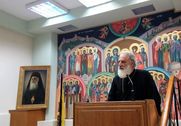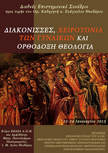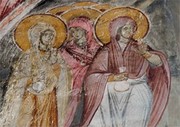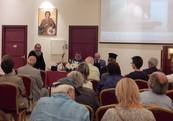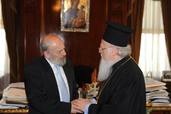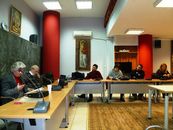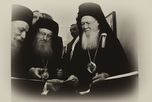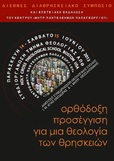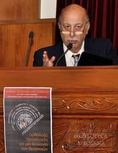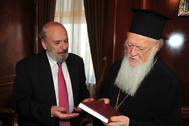Εκδηλώσεις του Κέντρου
ΝΕΟ 30.11.2021
ΓΙΑ ΤΗΝ ΕΝΟΤΗΤΑ ΤΗΣ ΕΚΚΛΗΣΙΑΣ ΤΟΥ ΧΡΙΣΤΟΥ
Οι Ανοιχτές Δημόσιες Διαλέξεις του CEMES για το 2021-22
Άρχισε στις 30 Νοεμβρίου 2021 η σειρά ανοιχτών επιστημονικών διαλέξεων, για τις οποίες ο Πρόεδρος επί τιμή του CEMES ως συντονιστής ανέφερε εισαγωγικά τα εξής:
«Η σημερινή είναι μια ιστορική ημέρα, τόσο για τα θεολογικά μας ιδρύματα που ασχολούνται με την αναζήτηση της ορατής ενότητας της Εκκλησίας, όσο και για την Ορθόδοξη και την Καθολική Εκκλησία, που συναντώνται σήμερα στην Κωνσταντινούπολη στη θρονική εορτή του Οικουμενικού Πατριαρχείου, σηματοδοτώντας επίσης την 30ή επέτειο της ανόδου της Αυτού Παναγιότητος του Οικουμενικού Πατριάρχου κ.κ. Βαρθολομαίου στο θρόνο της Νέας Ρώμης.
Είναι, όμως επίσης η ευλογημένη χρονιά κατά την οποία η Αυτού Αγιότης ο Πάπας Φραγκίσκος ανέλαβε τη θαρραλέα πρωτοβουλία να ξεκινήσει μια αυθεντική συνοδική διαδικασία στην Καθολική Εκκλησία, ανοίγοντας έτσι τον δρόμο για μια αυθεντική συνοδικότητα σε ολόκληρη την Εκκλησία του Χριστού. Αλλά και λόγω της επικείμενης επίσκεψής του στη χώρα μας
Εγκαινιάζουμε σήμερα το αγγλικό πρόγραμμα των δημόσιων ανοιχτών διαλέξεων του μεταπτυχιακού προγράμματος «Ορθόδοξη Οικουμενική Θεολογία» (MOET) του Κέντρου Οικουμενικών, Ιεραποστολικών και Περιβαλλοντικών Μελετών «Μητρ. Παντελεήμων Παπαγεωργίου» (CEMES), στο οποίο μετέχουν μέλη της Επιστημονικής Επιτροπής και του Διδακτικού του Προσωπικού, καθώς και του Οικουμενικού Ινστιτούτου του Ποντιφικού Πανεπιστημίου του Αγίου Θωμά (Angelicum), με την εναρκτήρια εισήγηση του Διευθυντή του, Αιδεσιμωτάτου καθηγητού π. Υακίνθου Destivelle.
Στο πρόγραμμα αυτό μετέχουν επίσης με διάφορες ειδικότητες και επιστήμονες της Οικουμενικής Μονής του Μπόζε, καθώς και των Αρχαίων Ανατολικών Ορθόδοξων (Προχαλκηδόνιων) Εκκλησιών και της Ουκρανικής Ελληνόρρυθμης Καθολικής Εκκλησίας, πάντοτε στις 18:00 μ.μ. ώρα Ελλάδος (17:00 ώρα Ιταλίας) και με μέγιστη διάρκεια πάντα την 1 ώρα και 30 λεπτά.
Τόσο το CEMES όσο και το Angelicum αποφάσισαν να αφιερώσουν τις Δημόσιες Ανοιχτές Διαλέξεις αυτού του ακαδημαϊκού έτους στις «σχέσεις μεταξύ των Ανατολικών Ορθοδόξων Εκκλησιών και της Καθολικής Εκκλησίας, τόσο της Ρωμαϊκής όσο και της Ελληνόρρυθμης».
Παράλληλα με αυτές τις αγγλικές διαλέξεις, φέτος το CEMES θα εγκαινιάσει επίσης και μια σειρά Δημόσιων Ανοιχτών Διαλέξεων στα Ελληνικά για το ελληνόφωνο κοινό σε όλο τον κόσμο με το ίδιο γενικό θέμα και την ίδια ώρα, ξεκινώντας από την επόμενη Τρίτη, με την εισήγηση του Ομότ. Καθ. Γρηγορίου Λαρεντζάκη, με θέμα: «Υπάρχει ‘κανονικό’ σχίσμα Ρώμης-Κωνσταντινουπόλεως;».
Τόσο στην αγγλική όσο και στην ελληνική σειρά διαλέξεων, εκτός από τον ομιλητή και τον συντονιστή θα μετέχουν δύο ακόμη επιστήμονες, με όσο το δυνατόν πιο περιεκτική εκπροσώπηση, για μια σε βάθος συζήτηση των θεμάτων.
Δράττομαι της ευκαιρίας λόγω του σημερινού κύριου ομιλητή, να υπενθυμίσω από την περίφημη παπική εγκύκλιο UT UNUM SINT τα εξής: «Το να πιστεύεις στον Χριστό σημαίνει να επιθυμείς την ενότητα. Το να επιθυμείς την ενότητα σημαίνει να επιθυμείς την Εκκλησία. Το να επιθυμείς την Εκκλησία σημαίνει να επιθυμείς την κοινωνία της χάριτος που αντιστοιχεί στο σχέδιο του Θεού Πατρός από καταβολής κόσμου. Αυτό είναι το νόημα της προσευχής του Χριστού: «ίνα πάντες εν ώσιν» (Ut unum sint).
Παρά την επιτυχή έκβαση πολλών επισήμων θεολογικών διαλόγων, δεν έχει ακόμη επιτευχθεί κανένα σημαντικό βήμα προς την ευχαριστιακή ενότητα, λόγω ορισμένων προκαταλήψεων, τις οποίες αυτή η σειρά διαλέξεων σκοπεύει να αναλύσει με στόχο, όσο είναι δυνατόν, να ξεπεραστεί οποιοδήποτε κανονικό, ιστορικό, εκκλησιολογικό, θεολογικό κλπ. εμπόδιο έχει μέχρι σήμερα σταθεί ενάντια στην εντολή του Κυρίου μας ‘ίνα πάντες εν ώσιν’».
Στη συνέχεια, ο καθ. π. Destivelle εισηγήθηκε το θέμα: «Από το ‘σχίσμα’ στην ‘ατελή κοινωνία’. Η εξέλιξη της απόψεως της Καθολικής Εκκλησίας για την διαίρεση» (From Schism to Imperfect Communion. Evolution of the View of the Catholic Church on Division), το οποίο συζήτησαν οι καθηγητές π. Γεώργιος Kondothra, Ihor Shaban, Δημήτριος Κεραμιδάς και Νικόλαος Δημητριάδης.
Η όλη εκδήλωση μαγνητοσκοπήθηκε και είναι προσβάσιμη στο κανάλι YouTube του CEMES (https://www.youtube.com/watch?v=2VBKY2maTKI&t=104s και https://www.youtube.com/watch?v=6UJxsuTZ1x4)
«Η σημερινή είναι μια ιστορική ημέρα, τόσο για τα θεολογικά μας ιδρύματα που ασχολούνται με την αναζήτηση της ορατής ενότητας της Εκκλησίας, όσο και για την Ορθόδοξη και την Καθολική Εκκλησία, που συναντώνται σήμερα στην Κωνσταντινούπολη στη θρονική εορτή του Οικουμενικού Πατριαρχείου, σηματοδοτώντας επίσης την 30ή επέτειο της ανόδου της Αυτού Παναγιότητος του Οικουμενικού Πατριάρχου κ.κ. Βαρθολομαίου στο θρόνο της Νέας Ρώμης.
Είναι, όμως επίσης η ευλογημένη χρονιά κατά την οποία η Αυτού Αγιότης ο Πάπας Φραγκίσκος ανέλαβε τη θαρραλέα πρωτοβουλία να ξεκινήσει μια αυθεντική συνοδική διαδικασία στην Καθολική Εκκλησία, ανοίγοντας έτσι τον δρόμο για μια αυθεντική συνοδικότητα σε ολόκληρη την Εκκλησία του Χριστού. Αλλά και λόγω της επικείμενης επίσκεψής του στη χώρα μας
Εγκαινιάζουμε σήμερα το αγγλικό πρόγραμμα των δημόσιων ανοιχτών διαλέξεων του μεταπτυχιακού προγράμματος «Ορθόδοξη Οικουμενική Θεολογία» (MOET) του Κέντρου Οικουμενικών, Ιεραποστολικών και Περιβαλλοντικών Μελετών «Μητρ. Παντελεήμων Παπαγεωργίου» (CEMES), στο οποίο μετέχουν μέλη της Επιστημονικής Επιτροπής και του Διδακτικού του Προσωπικού, καθώς και του Οικουμενικού Ινστιτούτου του Ποντιφικού Πανεπιστημίου του Αγίου Θωμά (Angelicum), με την εναρκτήρια εισήγηση του Διευθυντή του, Αιδεσιμωτάτου καθηγητού π. Υακίνθου Destivelle.
Στο πρόγραμμα αυτό μετέχουν επίσης με διάφορες ειδικότητες και επιστήμονες της Οικουμενικής Μονής του Μπόζε, καθώς και των Αρχαίων Ανατολικών Ορθόδοξων (Προχαλκηδόνιων) Εκκλησιών και της Ουκρανικής Ελληνόρρυθμης Καθολικής Εκκλησίας, πάντοτε στις 18:00 μ.μ. ώρα Ελλάδος (17:00 ώρα Ιταλίας) και με μέγιστη διάρκεια πάντα την 1 ώρα και 30 λεπτά.
Τόσο το CEMES όσο και το Angelicum αποφάσισαν να αφιερώσουν τις Δημόσιες Ανοιχτές Διαλέξεις αυτού του ακαδημαϊκού έτους στις «σχέσεις μεταξύ των Ανατολικών Ορθοδόξων Εκκλησιών και της Καθολικής Εκκλησίας, τόσο της Ρωμαϊκής όσο και της Ελληνόρρυθμης».
Παράλληλα με αυτές τις αγγλικές διαλέξεις, φέτος το CEMES θα εγκαινιάσει επίσης και μια σειρά Δημόσιων Ανοιχτών Διαλέξεων στα Ελληνικά για το ελληνόφωνο κοινό σε όλο τον κόσμο με το ίδιο γενικό θέμα και την ίδια ώρα, ξεκινώντας από την επόμενη Τρίτη, με την εισήγηση του Ομότ. Καθ. Γρηγορίου Λαρεντζάκη, με θέμα: «Υπάρχει ‘κανονικό’ σχίσμα Ρώμης-Κωνσταντινουπόλεως;».
Τόσο στην αγγλική όσο και στην ελληνική σειρά διαλέξεων, εκτός από τον ομιλητή και τον συντονιστή θα μετέχουν δύο ακόμη επιστήμονες, με όσο το δυνατόν πιο περιεκτική εκπροσώπηση, για μια σε βάθος συζήτηση των θεμάτων.
Δράττομαι της ευκαιρίας λόγω του σημερινού κύριου ομιλητή, να υπενθυμίσω από την περίφημη παπική εγκύκλιο UT UNUM SINT τα εξής: «Το να πιστεύεις στον Χριστό σημαίνει να επιθυμείς την ενότητα. Το να επιθυμείς την ενότητα σημαίνει να επιθυμείς την Εκκλησία. Το να επιθυμείς την Εκκλησία σημαίνει να επιθυμείς την κοινωνία της χάριτος που αντιστοιχεί στο σχέδιο του Θεού Πατρός από καταβολής κόσμου. Αυτό είναι το νόημα της προσευχής του Χριστού: «ίνα πάντες εν ώσιν» (Ut unum sint).
Παρά την επιτυχή έκβαση πολλών επισήμων θεολογικών διαλόγων, δεν έχει ακόμη επιτευχθεί κανένα σημαντικό βήμα προς την ευχαριστιακή ενότητα, λόγω ορισμένων προκαταλήψεων, τις οποίες αυτή η σειρά διαλέξεων σκοπεύει να αναλύσει με στόχο, όσο είναι δυνατόν, να ξεπεραστεί οποιοδήποτε κανονικό, ιστορικό, εκκλησιολογικό, θεολογικό κλπ. εμπόδιο έχει μέχρι σήμερα σταθεί ενάντια στην εντολή του Κυρίου μας ‘ίνα πάντες εν ώσιν’».
Στη συνέχεια, ο καθ. π. Destivelle εισηγήθηκε το θέμα: «Από το ‘σχίσμα’ στην ‘ατελή κοινωνία’. Η εξέλιξη της απόψεως της Καθολικής Εκκλησίας για την διαίρεση» (From Schism to Imperfect Communion. Evolution of the View of the Catholic Church on Division), το οποίο συζήτησαν οι καθηγητές π. Γεώργιος Kondothra, Ihor Shaban, Δημήτριος Κεραμιδάς και Νικόλαος Δημητριάδης.
Η όλη εκδήλωση μαγνητοσκοπήθηκε και είναι προσβάσιμη στο κανάλι YouTube του CEMES (https://www.youtube.com/watch?v=2VBKY2maTKI&t=104s και https://www.youtube.com/watch?v=6UJxsuTZ1x4)
(7.2.19) THE CONTRIBUTION OF BROTHERHOODS IN THE ORTHODOX CHURCH
(with the participation of CEMES)
The theme of the conference is “Orthodox Brotherhoods in the History of Russia: The Phenomenon of Unity in a Scattered World”
“The last year gives many reasons for thinking about unity in the Orthodox world. And it is important for us that the experience of informal unity, which was revealed in the church brotherhoods, should not be forgotten,” said Oleg Glagolev, chairman of the St. Elizabeth small Orthodox fraternity, welcoming the participants of the conference, which opened on February 7 in the Yekaterinburg pilgrimage center.
The blessing of the Metropolitan of Yekaterinburg and Verkhoturye Kirill to the participants was handed over by the head of the Missionary Department of the Yekaterinburg Diocese, Priest Daniel Ryabinin.
“I am very pleased that the topics on the history of the Orthodox brotherhoods turned out to be in demand and, moreover, fruitful,” said the rector of the St. Philaret Orthodox Christian Christian Institute, priest George Kochetkov “After all, for our church now the most important question is how to arrange our inner life.”
The special theme of the conference is the history of the Orthodox brotherhoods and spiritual unions during the Civil War. The conference organizers are obliged to this by the venue of the conference, connected with the tragic memory of the last days of the royal family, shot by the Bolsheviks.
The report of the rector of SFI, who opened the plenary session, was devoted to the brotherhoods as a spiritual phenomenon of the post-Constantine era of church history. Father George noted that “although the church itself rarely felt the transitions between these epochs, because it required a lot of effort, creative self-knowledge and even prophetic revelation about itself,” over the course of historical time we all understand more acutely the difference between post-Constantine periods of church history.
Thus, the emergence of monasticism with its new ascetic ideal and the practice of individual salvation, ecumenical councils, the system of canon law, rigidly formulated dogmatic teaching, the system of liturgical sacraments, the new system of church management and organization of life, and most importantly - the new attitude to the hierarchy and the so-called laity, and then to the state and the world - signs of the onset of the Constantine era. “All these characteristics began to change radically again when this period of church history began to end, starting with the non-Christian French revolution in the West and the anti-Christian October revolution in Russia,” Father George noted. “Spiritually sensitive, first of all, the Russian people felt this keenly, calling the new era post-Constantine.”
Based on this historiosophical distinction, the Rector of the SFI shared his thoughts on what challenges the current era poses to churches and Orthodox brotherhoods and what should be rethought in connection with the new relationships of people with themselves, with God and their neighbors.
Before and after 1917, including the question of their relationship to power, the pro-rector of the St. Petersburg Theological Academy on scientific and theological work, Archpriest Konstantin Kostromin, will continue the theme of the differences between church brotherhoods on the last day of the conference.
At the first plenary meeting, the reports of the well-known historian Kirill Aleksandrov “The Anti-Christian Meaning of Bolshevism and the Christian Significance of the White Movement”, the senior teacher of the Omsk Theological Seminary of Archpriest Dmitry Olikhov “The activities of the Brotherhood of St. Hermogenes in Siberia in 1919 as an example of spiritual opposition of the“ white ”and“ red "During the Civil War" and associate professor of the Don State Technical University Yulia Biryukova (Rostov-on-Don) "Activity of the Brotherhood of the Life-giving Cross and also Archpriest Vladimir Vostokov in the South of Russia during the Civil War (1919)”.
Distinguished Professor of Thessaloniki University, President of the Center for Ecumenical, Missiological and Environmental Studies (CEMES) Petros Vasiliadis (The Greek Orthodox Church) will talk about the movements of church renewal in the light of Orthodox ecclesiology on the example of Greek brotherhoods. The First Vice-Rector of the SFI Dmitry Gasak will present a report on the principles of presbyterian service in the Russian church tradition of the 20th century. Archpriest Peter Mangilyev, Vice-Rector of the Yekaterinburg Theological Seminary, will talk about the communal tradition in the Old Believers.
The main directions of fraternal services of the church and the world, the emergence of sober brotherhoods, fraternities and sisterhoods in the monastic tradition will be discussed. Its chairman Hamlet Zakaryan (Yerevan) will speak about the history and modern experience of the Brotherhood of the Armenian Apostolic Church.
The conference was attended by historians, cultural scientists, sociologists, philosophers and theologians, in whose field of research interest is the phenomenon of Orthodox communities, fraternities, associations and unions.
The III All-Russian Scientific Conference with international participation “Orthodox brotherhoods in the history of Russia: the phenomenon of unity in a scattered world” lasted three days. Its organizers are the St. Philaret Orthodox Christian Institute, the Transfiguration Commonwealth of Small Orthodox Brotherhoods and the Yekaterinburg Diocese (Missionary Department).
Author: SOFIA ANDROSENKO Photo: ALEXANDER VOLKOV
“The last year gives many reasons for thinking about unity in the Orthodox world. And it is important for us that the experience of informal unity, which was revealed in the church brotherhoods, should not be forgotten,” said Oleg Glagolev, chairman of the St. Elizabeth small Orthodox fraternity, welcoming the participants of the conference, which opened on February 7 in the Yekaterinburg pilgrimage center.
The blessing of the Metropolitan of Yekaterinburg and Verkhoturye Kirill to the participants was handed over by the head of the Missionary Department of the Yekaterinburg Diocese, Priest Daniel Ryabinin.
“I am very pleased that the topics on the history of the Orthodox brotherhoods turned out to be in demand and, moreover, fruitful,” said the rector of the St. Philaret Orthodox Christian Christian Institute, priest George Kochetkov “After all, for our church now the most important question is how to arrange our inner life.”
The special theme of the conference is the history of the Orthodox brotherhoods and spiritual unions during the Civil War. The conference organizers are obliged to this by the venue of the conference, connected with the tragic memory of the last days of the royal family, shot by the Bolsheviks.
The report of the rector of SFI, who opened the plenary session, was devoted to the brotherhoods as a spiritual phenomenon of the post-Constantine era of church history. Father George noted that “although the church itself rarely felt the transitions between these epochs, because it required a lot of effort, creative self-knowledge and even prophetic revelation about itself,” over the course of historical time we all understand more acutely the difference between post-Constantine periods of church history.
Thus, the emergence of monasticism with its new ascetic ideal and the practice of individual salvation, ecumenical councils, the system of canon law, rigidly formulated dogmatic teaching, the system of liturgical sacraments, the new system of church management and organization of life, and most importantly - the new attitude to the hierarchy and the so-called laity, and then to the state and the world - signs of the onset of the Constantine era. “All these characteristics began to change radically again when this period of church history began to end, starting with the non-Christian French revolution in the West and the anti-Christian October revolution in Russia,” Father George noted. “Spiritually sensitive, first of all, the Russian people felt this keenly, calling the new era post-Constantine.”
Based on this historiosophical distinction, the Rector of the SFI shared his thoughts on what challenges the current era poses to churches and Orthodox brotherhoods and what should be rethought in connection with the new relationships of people with themselves, with God and their neighbors.
Before and after 1917, including the question of their relationship to power, the pro-rector of the St. Petersburg Theological Academy on scientific and theological work, Archpriest Konstantin Kostromin, will continue the theme of the differences between church brotherhoods on the last day of the conference.
At the first plenary meeting, the reports of the well-known historian Kirill Aleksandrov “The Anti-Christian Meaning of Bolshevism and the Christian Significance of the White Movement”, the senior teacher of the Omsk Theological Seminary of Archpriest Dmitry Olikhov “The activities of the Brotherhood of St. Hermogenes in Siberia in 1919 as an example of spiritual opposition of the“ white ”and“ red "During the Civil War" and associate professor of the Don State Technical University Yulia Biryukova (Rostov-on-Don) "Activity of the Brotherhood of the Life-giving Cross and also Archpriest Vladimir Vostokov in the South of Russia during the Civil War (1919)”.
Distinguished Professor of Thessaloniki University, President of the Center for Ecumenical, Missiological and Environmental Studies (CEMES) Petros Vasiliadis (The Greek Orthodox Church) will talk about the movements of church renewal in the light of Orthodox ecclesiology on the example of Greek brotherhoods. The First Vice-Rector of the SFI Dmitry Gasak will present a report on the principles of presbyterian service in the Russian church tradition of the 20th century. Archpriest Peter Mangilyev, Vice-Rector of the Yekaterinburg Theological Seminary, will talk about the communal tradition in the Old Believers.
The main directions of fraternal services of the church and the world, the emergence of sober brotherhoods, fraternities and sisterhoods in the monastic tradition will be discussed. Its chairman Hamlet Zakaryan (Yerevan) will speak about the history and modern experience of the Brotherhood of the Armenian Apostolic Church.
The conference was attended by historians, cultural scientists, sociologists, philosophers and theologians, in whose field of research interest is the phenomenon of Orthodox communities, fraternities, associations and unions.
The III All-Russian Scientific Conference with international participation “Orthodox brotherhoods in the history of Russia: the phenomenon of unity in a scattered world” lasted three days. Its organizers are the St. Philaret Orthodox Christian Institute, the Transfiguration Commonwealth of Small Orthodox Brotherhoods and the Yekaterinburg Diocese (Missionary Department).
Author: SOFIA ANDROSENKO Photo: ALEXANDER VOLKOV
ΧΑΙΡΕΤΙΣΜΟΣ
Προς τους οργανωτές και μετέχοντες του διεθνούς συνεδρίου με θέμα:
Eastern Orthodoxy and Inter-Religious Encounter in a Secular Age
(Ανατολική Ορθοδοξία και διαθρησκειακές σχέσεις στο σύγχρονο κόσμο)
Thessaloniki, September 12, 2017
Your Eminence, President of the Volos Academy
Dear colleagues from both the co-organizing institutions,
Dear participants of the Conference,
Sisters and brothers in Christ.
On behalf of the Honorary President, His Eminence Metropolitan of Thessaloniki, Mgr. Anthimos and all the members of the Center for Ecumenical, Missiological and Environmental Studies “Metropolitan Panteleimon Papageorgiou” (CEMES), I would like to express our sincere gratitude to the Volos Academy for Theological Studies, a pioneer Orthodox institution promoting the dialogue with the secular world, as well as the University of Exeter, for organizing this conference.
Given the affirmation of the Orthodox engagement in the interfaith dialogues, expressed at the highest conciliar level of the Eastern Orthodox Church, but also the “paradigm shift” in world mission toward on “inter-faith dialogue”, and in particular on the basis of a theological contribution by the Orthodox, the articulation of an Orthodox "theology of religions" constitutes a responsibility of the Orthodox academic community to the Orthodox Church.
These ideas were expressed at the final communique of a similar academic symposium – though confined only to the Greek speaking theological resources – held in Thessaloniki four years ago. The general conclusion of this symposium was that both in the Bible and in the Patristic tradition there are elements that present the other religions as human constructions, but there are also other testimonies that while recognize Christ as the unique Savior of the world and his church as the ark of salvation, they accept the saving presence of God beyond the boundaries of the Church. From a theological perspective, and especially within the frame of the Orthodox tradition, it was argued that a synthesis of the two positions is possible; after all they constitute equally substantial elements of our Christian faith. For this reason any Orthodox formulation of a theology of religions should be based on the catholicity of the Christian tradition and not on selective elements that in most cases reflect personal phobias and ideological conservative or liberal perceptions.
The inter-faith dialogue is also a sine-qua-non in ours Church’s witness to the gospel, if our ecumenical efforts do not aim at an anti-modern front but at working hand by hand with the faithful of other religions and beliefs instead of fighting one another, thus enormously contributing to a tolerant, peaceful, just, and sustainable society. Its final conclusion was that from the viewpoint of Orthodox theology a "theology of religions" is possible, feasible, but also legitimate; it requires however further scientific theological investigation. And we hope and pray that this present endeavour will cover this need.
Congratulating you again for your invaluable theological contribution we wholeheartedly wish you and all the participants the wisdom from above and a success in your efforts.
Petros Vassiliadis
Prof. Emeritus of the University of Thessaloniki
President of CEMES
(www.cemes-en.weebly.com)
|
Προετοιμασία του αγγλόφωνου μεταπτυχιακού προγράμματος του CEMES
|
Παρουσίαση του έργου ενός διακεκριμένου Ορθόδοξου ειρηνιστή, του Jim Forest
|
|
Εκδήλωση οικουμενικού ενδιαφέροντος του Κέντρου στην Ξάνθη
|
Το διεθνές διεπιστημονικό συνέδριο για την Περιεκτική Οικολογία
|
Humble Theological Contribution to our Orthodox Church on Her Way
to the 2016 Pan-Orthodox Council:
A research project in three parts for the period December 2014 - March 2016
to the 2016 Pan-Orthodox Council:
A research project in three parts for the period December 2014 - March 2016
Copyright © CEMES 2014
